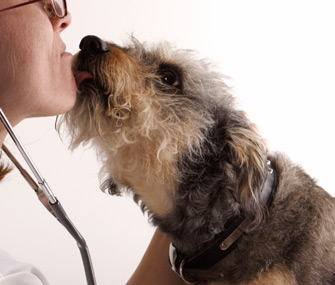When Pets Kiss the Vet: Goofy, Gross or Great?
Published on October 10, 2013

Sometimes it’s the yucky little things we love best about our pets. In my case, it’s often about the sloppy kisses they offer. Call me syrupy or call me gross, but I consider cat and dog kisses to be awesome little reminders of all their animal-y wondrousness, especially when they’re offered in the context of a veterinary visit.
Forget the atrocious breath, the intrusive tongue, the copious drool, and the certain knowledge that feces have recently been where your face now resides, slobbery dog kisses are awesome. And while nowhere as enthusiastic, sweet kitty kisses are every bit as good. (What they lack in exuberance they make up for in hygiene.)
Now, I know it’s a silly topic, but lately I’ve been musing on how willing most veterinarians are to be manhandled by energetic canine mouths and how thrilled we are when our feline patients deign to anoint us with their raspy tongues. I’ve been so preoccupied with the topic, in fact, that I simply couldn’t contain my thoughts any longer.
Busted by a Client
It all started after one of my clients recently called me out on my kiss-seeking behavior. Here’s how it happened:
[Trevor the chocolate Lab mix bounds into the exam room with Mr. Client in tow.]
Dr. K: Hi, Trevor! Aren’t you a sweet boy? Come over here and give Dr. Khuly a kiss!
[Trevor is only happy to comply.]
Mr. Client: Oh, Dr. Khuly, that’s disgusting! How many pets have slobbered all over you already today?
[Mr. Client makes a yucky face by way of emphasis.]
Dr. K: I’ve lost count.
Why wouldn’t I kiss my patients? It’s not like they’re human children (for whom cultural norms, basic propriety and potential infectious disease transmission preclude such close contact). They’re pets and, as such, as long as I’m familiar with their demeanor, it seems perfectly normal to solicit — or offer — a kiss.
After all, to kiss is to communicate — happily. Kissing, or, let’s speak plainly, licking is what dogs do by way of expressing any number of positive emotions. Though far more subdued in their lingual approach, even cats seem to advance their tongue as a positive gesture of appreciation. (Luckily, “tasting before biting” isn’t a common approach, whether we’re talking about dogs or cats.)
Play, greeting, excitement, exploration, solicitation and just plain adoration can all serve as explanation for the lowly licking behavior so many humans inexplicably abhor.
Lick Likers and Dislikers
I mean, I love a licky dog. But not everyone feels the same way. My father claims it gives him the willies. Others disdain the slobbery, drool-y component. But what’s a little saliva among friends, I ask? What’s up with all these kiss-a-phobics?
Based on my everyday life as a veterinarian, here are a couple of observations on the kissing front:
1. Men, more than women, seem to claim they do not enjoy a dog’s lick. "Creepy," "gross" or "messy" rule the vocabulary on this score.
2. Large dog people appear to be overrepresented in their dislike of a lick. ("Does he really have to wash my entire face each time he wants to say he’s happy?") Small dog owners, by contrast, seem likelier to welcome this brand of communication with its associated saliva stains, foul breath, social awkwardness — makeup disasters be damned!
Like most veterinarians I know, I’m open to all brands of pet-licking behavior. Nonetheless, I can understand when people say they can’t stand it when their Mastiff applies his slippery 6"-by-16" tongue to his owner’s face after she’s just put on her morning makeup. But a little kitty lick? A teensy tongue’s worth of affection?
Indeed, how can anyone — especially a veterinarian — resist a pet’s public displays of affection? I can’t. After all, we veterinarians have to take our simple pet pleasures wherever we can get them… even if they are a bit “gross” on occasion.





